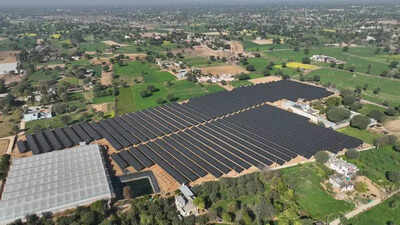- News
- More farmers getting connected to solar, govt eyes to cut subsidies
More farmers getting connected to solar, govt eyes to cut subsidies
Jaipur: Reflecting the urgency to solarise agriculture connections and utilise the barren and semi-barren land of the farmer to improve their incomes through the generation of green power, the energy department added 418 MW worth of plants in the past year against a cumulative capacity of 124 MW installed between 2019 and 2023.
The speed also mirrors the department's intent to drastically reduce subsidies of costly power, which is pushing the discoms into financial distress every day. Chief Minister Bhajan Lal Sharma has committed to providing day-power to all the farmers in the state by the end of 2027.
ACS (energy) Alok, said, "In little over a year, 252 decentralized solar power generation plants of 418 MW capacity have been installed under Jaipur, Jodhpur and Ajmer discom areas under the Kusum schemes to expedite the mission of providing power during daytime to the farmers. We have a strategy to solarize all agriculture connections as per the target of the state govt."
Of the two Kusum scheme components, one covers projects where the farmers use their barren land and generate and sell power to the discoms, improving their incomes. Through the other, the govt is setting up solar plants at the local sub-station level through private players to meet the agriculture demand. Currently, 39,000 farmers are getting electricity during the day from plants of 542 MW.
Similarly, it approved an additional allocation of 6,000 MW capacity in Kusum A last year. He said, "Now, the target is to set up plants of about 12,000 MW capacity under the scheme and make the promise of providing electricity to all the farmers during the day a reality." Through these smaller projects at the sub-station level, not only are the discoms getting cheaper power at around Rs 3 a unit, but the energy department is also saving costs on transmission as the power is generated and consumed locally.
End of Article
FOLLOW US ON SOCIAL MEDIA










